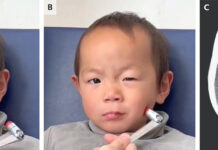Hyperemesis during pregnancy in a 19-year-old girl… was it a pregnancy symptom or there was more to it?
A 19-year-old African-American female came to the emergency department with complaints of nausea, vomiting, and upper abdominal pain for the past 3 days. She was twenty weeks pregnant at the time of the presentation. The patient complained of an inability to keep food or water down, consequently losing ten pounds.
Her past history had evidence of previous such episodes for which she had been admitted to the hospital multiple times. She had been diagnosed with gastritis as a child.
The patient had not been diagnosed with any psychiatric disorder, nor she had a similar history.
In the emergency department, the patient was given intravenous fluids for dehydration and promethazine for nausea and vomiting. The treatment did not help the patient, and the symptoms persisted. However, diphenhydramine and hot showers gave her some relief.
On examination, the patient was alert, oriented, and conscious. Her vital signs were: a heart rate of 106 beats per minute and blood pressure of 163/75 mmHg. The rest of the values were normal.
Blood was withdrawn for serological investigations. Her comprehensive metabolic panel revealed normal liver function, lipase, thyroid-stimulating hormone, and serum creatinine. Measurement of electrolytes revealed a mildly low sodium level of 132 mmol/L.
Ultrasound abdomen was performed, which showed small stones and sludge in the gallbladder. The rest of the abdomen was normal on ultrasound. Pelvic and abdominal ultrasound ruled out ectopic pregnancy and appendicitis.
Abdominal X-ray showed normal bowel gas pattern.
The urine drug test was positive for tetrahydrocannabinol. She reported using cannabis daily until one week before the presentation.
During hospital admission, the patient often unhooked her lines to lie in the shower. The patient was started on haloperidol. The vomiting continued, due to which she developed hypokalemia and hypomagnesemia. Potassium and magnesium supplements were started.
Gastroenterology and psychiatric consultation were done, and she was diagnosed with Cannabinoid Hyperemesis Syndrome due to
- Her chronic daily consumption of cannabis
- Cyclic vomiting
- Relief of symptoms with hot showers.
There is no standard criterion to diagnose CHS. In pregnant patients, it may be misdiagnosed as Hyperemesis gravidarum or Cyclic vomiting syndrome (CVS), but the history of chronic cannabis use, as seen in this patient, relief from hot water bathing and dronabinol help diagnose CHS.
The patient was educated and counseled regarding the cessation of cannabis for an utter resolution of symptoms. The gastroenterologist prescribed her dronabinol 2.5 mg twice a day to “taper” off cannabis.
She was given the following medications during her 3-day-hospital stay:

The patient had improved substantially, after which she was discharged with a prescription of dronabinol and promethazine for the following 2 weeks. The patient was then lost to follow-up.
Source: Nguyen TAH, Palmer MC (2019) Cannabinoid Hyperemesis Syndrome in Pregnancy: A Case Report and Treatment Overview. J Clin Gastroenterol Treat 5:069. doi.org/10.23937/2469-584X/1510069




